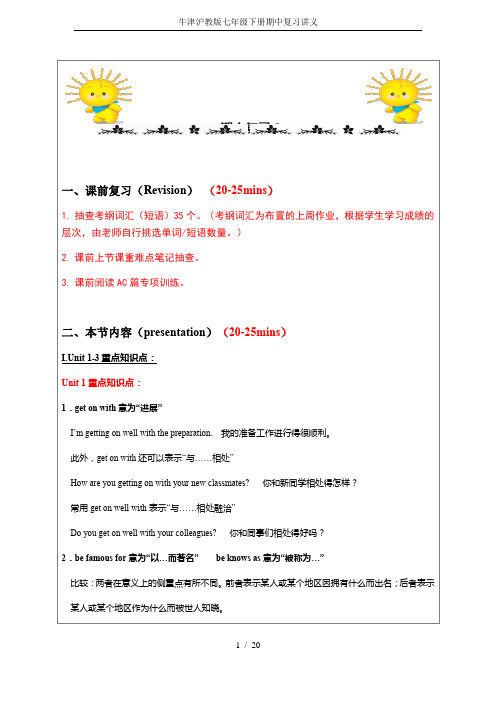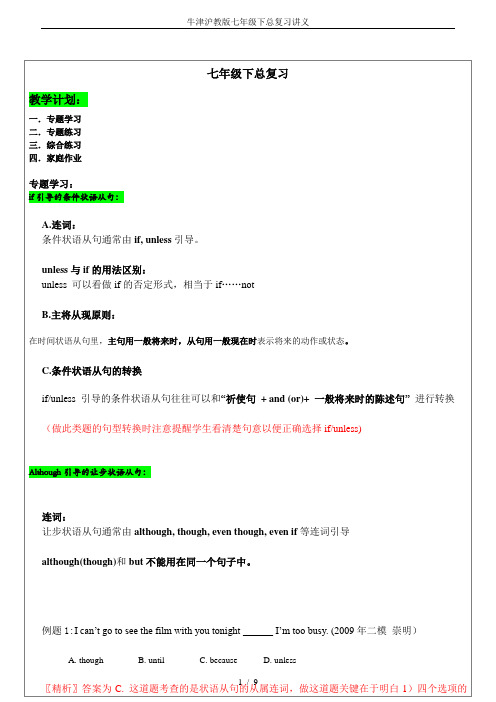牛津沪教版英语七年级下一般将来时复习讲义(无答案)
牛津译林版英语七年级下册Unit2Grammar一般将来时讲义

时态专练 ------ 一般将来时(7BU2Grammar)★概念:表示将要发生的动作或存在的状态及打算、计划或准备做某事。
★时间状语:tomorrow, the day after tomorrow, soon, in the future, the coming Sunday, from now on…•next day(week, month, year…),•in a few minutes, ---etc.★基本结构:①be(am/is/are)going to + do;②will/shall + do.A) 基本结构是will / shall do。
例:We shall send her an MP5 as her birthday gift.B) 表示“打算去……,要……”时,可用be going to do。
例:This is just what I am going to say.(这正是我想说的。
)C) 表示“即将、正要”时,可用be about to do。
强调近期内或马上要做的事。
例:Don't worry, I am about to make a close examination on you.D) “be to do” 表示“按计划、安排即将发生某事或打算做某事”。
例:He is to go to travel next week.◆shall/will/be going to之间的区别:1.)shall往往用于第一人称疑问句, will可用于任何人称。
2.)will常用于表邀请或命令时以及带有意愿色彩。
3.)计划决定要做某事,一般用be going to do 结构。
◆一般将来时的特例▲1.用现在进行时表示表示位置转移的动词(如:go, come, leave, start, arrive, be close, open, play, return, sleep, stay等),可用现在进行时表示将来时。
牛津沪教版七年级下册期中复习讲义

牛津沪教版七年级下册期中复习讲义
期中复习1
牛津沪教版七年级下册期中复习讲义
牛津沪教版七年级下册期中复习讲义
牛津沪教版七年级下册期中复习讲义
牛津沪教版七年级下册期中复习讲义
D E F
1._______
2._______
3._______
4._______
5.________
牛津沪教版七年级下册期中复习讲义
牛津沪教版七年级下册期中复习讲义
牛津沪教版七年级下册期中复习讲义
. Also, the horse looks very lovely. It has a pair of bright
one is about Charlie Chaplin. He was a great British actor. His works still influence(影响)
hat, baggy trousers
牛津沪教版七年级下册期中复习讲义
ation for the rose. It’s an He dropped it on the floor and stepped on it with his shoe.
牛津沪教版七年级下册期中复习讲义。
牛津沪教版英语七年级下Unit 1新课讲义(答案不全)

七年级下Unit 1一、新课讲解【词汇学习】1)decide [dɪ'saɪd]【词性】v. 【词义】下决心;(使)决定,解决,裁决,肯定,断定【例句】They decided against an expensive education for their children.2)beauty ['bjuːti]【词性】n. 【词义】美丽,美好的事物【例句】I shall never forget the beauty of the West Lake.3)local ['ləʊkl]【词性1】adj. 【词义1】当地的,地方的【词性2】v. 【词义2】找出位置,设置【例句】The hospital is to be located in the suburbs.4)tour [tʊə]【词性1】n. 【词义1】旅行,观光【词性2】v. 【词义2】旅行,观光【易混淆点】tourist n.旅游者tourism n.旅游业【例句】We are going to tour Europe.5)discuss [dɪ'skʌs]【词性】v. 【词义】讨论,商议【例句】Shall we discuss where we are going for our holiday?6)famous ['feɪməs]【词性】adj. 【词义】著名的【易混淆点】fame n.名望,声望【例句】He is famous for his learning.7)international [͵ɪntə'næʃnəl]【词性】adj. 【词义】国际的,世界的【易混淆点】national adj.国家的,民族的,某国家或民族特有的【例句】The United Nations is an international organization.8)know [nəʊ]【词性】v. 【词义】懂得,知道,了解,熟悉【易混淆点】knowledge n.(u) 知识,学问,了解【例句】They knew themselves to be in a difficult position.9)surprise [sə'praɪz]【词性1】v. 【词义1】使惊讶,使诧异【词性2】n. 【词义2】使人惊讶的事【易混淆点】surprised adj. 感到惊讶的;出人意外的surprising adj. 令人惊异的;惊人的【例句】His good marks surprised his father.10)convenient [kən'viːniənt]【词性】adj. 【词义】方便的【例句】It’s not convenient for me to ring him up.11)science ['saɪəns]【词性】n. 【词义】科学(一门学科)【易混淆点】scientist n. 科学家【例句】His ambition is to be a scientist in the future.12)information [͵ɪnfə'meɪʃn]【词性】n. 【词义】通知,情报,消息【易混淆点】inform v. 告诉,通知,告发【例句】You can get information about the famous place from the travel service. 13)reason ['riːzn]【词性】n. 【词义】理由,原因【易混淆点】reasonable adj. 理智的,合理的,公道的【例句】I’m willing to pay a reasonable offer.14)interest ['ɪntrəst]【词性】n. 【词义】兴趣,趣味,关心【易混淆点】interested adj. 使……感兴趣interesting adj. 感兴趣的【例句】The book caused great interest and argument.【上海著名地标】1)People's Square2)Yu Garden3)Suzhou Creek4)the Huangpu River5)the Bund6)Shanghai Grand Theatre7)Shanghai Museum8)Shanghai Zoo9)Shanghai Botanical Gardens10)Shanghai Wild Animal Park11)Shanghai Science and Technology Museum 12)Century Park 人民广场豫园苏州河黄浦江外滩上海大剧院上海博物馆上海动物园上海植物园上海野生动物园上海科技馆世纪公园13)Oriental Pearl TV Tower14)Pudong New District15)Grand Gateway Plaza16)Sheshan State Resort17)Dongping National Forest Park 18)Changfeng Park19)Luxun Park20)Longhua Temple21)Yangpu Bridge22)Nanpu Bridge23)Lupu Bridge 东方明珠电视塔浦东新区港汇广场佘山国家旅游度假区东平国家森林公园长风公园鲁迅公园龙华寺杨浦大桥南浦大桥卢浦大桥【条件状语从句】一、定义:表示假定主句某事发生的条件。
牛津沪教版英语七年级下重点时态复习

七年级下重点时态专题专题讲解一、一般现在时(1)表示经常发生或习惯性反复发生的动作。
(常用时间状语always, usually, often, sometimes, seldom, never, every day, twice a week, in the morning, on Sundays, on the weekend等)e.g.: I often watch TV at home.He does his homework every night.(2)表示主语现在的特征、性格、能力、爱好、习惯、状态,通常不带时间状语。
e.g.: Do you speak English?She likes English, but she doesn’t like math.(3)表示客观真理、科学事实、格言等。
e.g.:The sun rises in the east.There are seven days in a week.(4)表示按时间表拟定的或安排好到时候就发生的事情或动作。
e.g.: The train arrives at six o’clock.The final exam takes place next week.Our trip starts from Xi'an tomorrow.(5)在时间状语从句和条件状语从句中代替一般将来时。
e.g.: I will discuss this with you when we meet next time.If it doesn’t rain tomorrow, we will go to the cinema.◆课堂练习:( ) 1. --- Mum, _______ shall we have lunch?--- We will have it when your dad _________.A. when; returnsB. where; returnsC. where; will returnD. when; will return( ) 2. --- Tomorrow will be Father's Day. What will you do for your father?--- I will say "I love you, Daddy" as soon as he _______ up.A. will wakeB. is wakingC. wakesD. woke( ) 3. Our teacher said light ________ faster than sound.A. travelledB. has travelledC. is travellingD. travels( ) 4. --- Let’s go fishing if it _______ this weekend.--- But nobody knows if it _______.A. is fine, will rainB. will be fine, rainsC. is fine, rainsD. will be fine, will rain( ) 5. --- Is your father a doctor?--- Yes, he is. He ________ in Town Hospital.A. has workedB. had workedC. worksD. worked二、一般过去时(1)表示过去某个时间所发生的动作或存在的状态。
上海牛津沪教版七年级下同步讲义unit7

第七讲 Unit7 In the future教学过程一、课堂导入教师讲述一个及本节课题目有关的英文小故事,引出今日所要讲解的知识点,然后让学生简单梳理一下所涉及的问题,带着问题学习本节课的内容。
二、复习预习教师引导学生复习上节课学的重点内容,检测单词的用法,(以提问、回顾的形式进行),针对上节课的作业进行讲评、订正、答疑,并通过英文小故事导入本节课所要学习的新知识。
三、知识讲解1. 知识点一:重点单词1)able ['eɪbl]【词性】adj.【词义】有能力的【易混淆点】be able to 常表示经过后天努力而具有能力做某事can 常表示本身具有能力做某事【经典例句】I am able to pay you now.我现在能付给你钱了。
2)hope [həʊp]【词性】n.【词义】希望;期望【易混淆点】hope 一般指可实现的希望wish 一般指难以实现的愿望【经典例句】I hope to hear from you soon.我希望不久能收到你的来信。
3)secret ['siːkrət]【词性】adj.【词义】秘密的【易混淆点】secret 秘密的mysterious 神秘的【经典例句】They were forced to publish the secret news.他们被迫公开秘闻。
2. 知识点二:重点词组1)talk about 谈论;讨论;商讨2)be able to 能够;有能力3)space station 航天站4)in the future 在未来5)live on other planets 居住在其他星球上6)grow vegetables 种植蔬菜7)speak the same language 讲同一种语言8)travel to 到......去旅行9)take pills for meals 服药片代替吃饭10)in ten years’ time 十年之后11)seal it with tape 用胶带密封3. 知识点三:重点句型1)What do you think will happen in the future?你们认为将来会发生什么?2)We can keep the time box in a secret place.我们可以把时间盒放在一个秘密的地方。
牛津沪教版七年级下总复习讲义

七年级下总复习教学计划:一.专题学习二.专题练习三.综合练习四.家庭作业专题学习:if引导的条件状语从句:A.连词:条件状语从句通常由if, unless引导。
unless与if的用法区别:unless 可以看做if的否定形式,相当于if……notB.主将从现原则:在时间状语从句里,主句用一般将来时,从句用一般现在时表示将来的动作或状态。
C.条件状语从句的转换if/unless 引导的条件状语从句往往可以和“祈使句+ and (or)+ 一般将来时的陈述句” 进行转换(做此类题的句型转换时注意提醒学生看清楚句意以便正确选择if/unless)Although引导的让步状语从句:连词:让步状语从句通常由although, though, even though, even if等连词引导although(though)和but不能用在同一个句子中。
例题1:I can’t go to see the film with you tonight ______ I’m too busy. (2009年二模崇明)A. thoughB. untilC. becauseD. unless含义2)主句和从句的意思和关系。
A尽管B直到C因为D除非。
主句意为“今晚我不能和你去看电影”,从句意为“我太忙了”,根据句意这两句的关系应为“因果”关系,所以选C例题2:Unless it ________, we’ll visit Shanghai Wild Animal Park this weekend.(2009年二模卢湾)A. rainsB. will rainC. hasn’t rainedD. is raining〖精析〗答案为A. 这道题考的是条件状语从句的“主将从现”原则(主句用一般将来时,从句用一般现在时)。
根据状语从句的结构,紧跟着连词的为从句,即“Unless it ________”为从句,用一般现在时。
上海牛津沪教版七年级下同步讲义unit

上海牛津沪教版七年级下同步讲义unit 第九讲U n i t9T h e w i n d i s b l o w i n g教学过程一、课堂导入教师讲述一个与本节课题目有关的英文小故事,引出今日所要讲解的知识点,然后让学生简单梳理一下所涉及的问题,带着问题学习本节课的内容。
二、复习预习教师引导学生复习上节课学的重点内容,检测单词的用法,(以提问、回顾的形式进行),针对上节课的作业进行讲评、订正、答疑,并通过英文小故事导入本节课所要学习的新知识。
三、知识讲解1. 知识点一:重点单词1)paragraph [?p?r?grɑ:f]【词性】n.【词义】段;段落【易混淆点】passage 章节paragraph段落【经典例句】Read these paragraphs and tell me what they mean.阅读这些段落,并告诉我他们是什么意思。
2)correct [k??rekt]【词性】adj.【词义】准确无误的;精确的;正确的【易混淆点】correct 精确的right 正确的【经典例句】Please put the paragraphs in the correct order.请把这些段落按照正确的顺序排序。
3)order [??:d?(r)]【词性1】n.【词义1】顺序;次序;命令【词性2】v.【词义2】预订【易混淆点】order 下订单,多用于书面语book 预订,多用于口头语【经典例句】Put these paragraphs in the correct order to make a story. 把这些段落按正确的顺序排序以组成一个故事。
4)proud [pra?d] 【词性】adj.【词义】骄傲的【易混淆点】pound 英镑proud 自豪的【经典例句】Mr Wind was very proud.风先生很骄傲。
5)brightly ['bra?tl?]【词性】adv.【词义】阳光灿烂地;光线充足地;明亮地【易混淆点】bright n.光明adj. 明亮的brightly adv. 明亮地【经典例句】Mr Sun shone brightly.太阳先生明亮地闪耀着。
上海牛津英语七年级下知识点

上海牛津英语七年级下知识点在七年级下学期的牛津英语课程中,学生们需要学习并掌握一些重要的语法知识和单词,以便能够更准确地表达自己的想法和理解他人的意思。
下面将逐一介绍这些知识点。
一、时态在英语中,时态是表达时间的重要方法。
七年级下册需要学习的时态包括:一般现在时、一般过去时、一般将来时和现在进行时。
掌握这些时态的用法可以使学生更好地描述过去、现在和未来的事情。
二、句型在七年级下学期还需要学习不同的句型,包括简单句、并列句和复合句等等。
学生需要掌握这些句型中不同组成部分的用法和特征,以便更好地书写自己的文章。
三、单词单词是语言中的基本单位之一,也是英语教学中必不可少的一部分。
在七年级下学期的牛津英语课程中,学生们需要掌握一些新的单词,比如:vacation、temperature、homework等等。
学生需要通过不断的练习来掌握这些新单词的拼写和意思。
四、语法在七年级下学期,学生们还需要学习英语语法中的基本概念和规则,比如主语和谓语的关系、名词性从句、形容词和副词比较级等等。
这些知识点可以帮助学生更好地理解英语句子的构成和文法规则。
五、听力听力是语言学习中一个非常重要的方面。
在七年级下学期的牛津英语课程中,学生需要通过听力训练来学习、理解和使用不同的语音和口音、短语和单词。
这有助于学生更好地了解英语的真实用法和语音语调。
六、阅读阅读是英语学习的重要组成部分。
在七年级下学期的牛津英语课程中,学生们需要通过各种材料来进行阅读,比如文章、故事、新闻、标语等等。
通过阅读,学生们可以更好地了解不同的语言和文化。
七、口语在英语学习中,口语是非常重要的方面。
在七年级下学期的牛津英语课程中,学生们需要通过口语练习来加强自己的口语表达能力。
通过不断地听、说、读、写,学生们可以提高英语水平。
总之,在七年级下学期的牛津英语课程中,学生们需要学习并掌握这些重要的知识点,以便更好地表达自己的想法和理解他人的意思。
只有通过不断的练习和巩固,才能真正掌握好英语语言。
- 1、下载文档前请自行甄别文档内容的完整性,平台不提供额外的编辑、内容补充、找答案等附加服务。
- 2、"仅部分预览"的文档,不可在线预览部分如存在完整性等问题,可反馈申请退款(可完整预览的文档不适用该条件!)。
- 3、如文档侵犯您的权益,请联系客服反馈,我们会尽快为您处理(人工客服工作时间:9:00-18:30)。
教学过程七年级下一般将来时复习1、引入:昨天,今天,明天(过去,现在,将来)2、定义:一般将来时表示将要发生的动作或存在的状态。
3、结构:助动词shall/will +V原形; be going to +V 原形Shall用于第一人称,will 用于第二,第三人称。
在现代英语中,尤其是美国英语中,各种人称都可以用will。
肯定句式Tom will go over his lessons after class.I shall/will buy a computer next month.否定句式:We shall/will not(shan’t/won’t)leave Shanghai until next Friday.They will not (won’t)come to visit us tomorrow.注意:shall not和will not的缩略形式分别是shan’t和won’t疑问句式Shall we set out at half past seven tomorrow?Will you go to plant trees with us this Sunday?What will you do after school tomorrow?3)其肯定回答用“Yes,...will···”,否定回答用“No,.won’t.”3.一般将来时的经典用法will 还可以用来表示“意愿”或“决心”eg:I will do my best to help you.be going to一般表示计划之中的事,有“打算,准备”之意eg : I am going to visit the city museum next weekend.When are you going to begin your work?be going to 还可用来表示即将发生或肯定要发生的事eg : I think it’s going to rain.I feel terrible ,I think I’m going to be sick.We all going to die some day.其它用法:1)一般现在时表示将来的情况用一般现在时表示将来情况主要是表示与安排、计划或与时刻表有关的动作Tomorrow is Thursday.What time does the match begin?Next train arrives at 12:40.2)现在进行时表将来的情况在表示未来的计划和安排时,常可用现在进行时When is she leaving for home ?December is coming ,everyone can’t wait to enjoy the atmosphere of Christmas Day.练习:一般将来时练习题选择题( ) 1. There __________ a meeting tomorrow afternoon.A. will be going toB. will going to beC. is going to beD. will go to be( ) 2. Charlie ________ here next month.A. isn’t workingB. doesn’t workingC. isn’t going to workingD. won’t work( ) 3. He ________ very busy this week, he ________ free next week.A. will be; isB. is; isC. will be; will beD. is; will be( ) 4. There ________ a dolphin show in the zoo tomorrow evening.A. wasB. is going to haveC. will haveD. is going to be( ) 5. –________ you ________ free tomorrow?–No. I ________ free the day after tomorrow.A. Are; going to; willB. Are; going to be; willC. Are; going to; will beD. Are; going to be; will be( ) 6. Mother ________ me a nice present on my next birthday.A. will givesB. will giveC. givesD. give( ) 7. –Shall I buy a cup of tea for you?–________. (不,不要。
)A. No, you won’t.B. No, you aren’t.C. No, please don’t.D. No, please.( ) 8. –Where is the morning paper?–I ________ it for you at once.A. getB. am gettingC. to getD. will get( ) 9. ________ a concert next Saturday?A. There will beB. Will there beC. There can beD. There are( ) 10. If they come, we ________ a meeting.A. haveB. will haveC. hadD. would have填空题1.Tomorrow I______ going to send an email.2.Next week he_____ going to visit his grandma.3.Next Monday we______ going to ______a picnic.4.Tonight they _____going to ________TV.5.Tonight he ______ going to eat some meat.动词填空1. I ______(leave)in a minute. I ______(finish)all my work before I ______ (leave).2. -How long _____ you _____(study)in our country?-I _____(plan)to be here for about one more year.-I _____(hope)to visit the other parts of your country.-What ______ you ______(do)after you ______(leave)here?-I ______(return)home and ______(get)a job.3. I ______(be)tired. I ______(go)to bed early tonight.4. Mary's birthday is next Monday, her mother _____(give)her a present.5. It is very cold these days. It ______(snow)soon.6. -_____ you _____(be)here this Saturday?-No. I ______(visit)my teacher.7. -______ I ______(get)you a copy of today's newspaper?-Thank you.8. I am afraid there ______(be)a meeting this afternoon. I can't join you.9. Mike ______(believe, not)this until he ______(see)it with his own eyes.10. Most of us don't think their team ______(win).做完练习轻松一下'll Be There 我會在那裡Michael Jackson (Jackson 5)You and I must make a pact, 你和我一定要來一個約定,we must bring salvation back 我們一定要把出路/救星帶回來...Where there is love, 哪裡有愛,I'll be there 我都會在那裡。
I'll reach out my hand to you, 我向你伸出我的手I'll have faith in all you do 我會信任你做的所有事Just call my name 祗要喊出我的名字and I'll be there 我都會在那裡And oh 和I'll be there to comfort you, 我會在那裡去安慰你Build my world of dreams around you, 在你周圍建立我夢想中的世界I'm so glad that I found you 我很開心我找到了你I'll be there with a love that's strong 我會帶著強烈的愛在那里I'll be your strength, 我會成為你的力量I'll keep holding on 我會堅持下去yes I will, 對,我會yes I willLet me fill your heart with joy and laughter 讓我用歡樂和笑聲填滿你的心Togetherness, well that's all I'm after 和睦,那就是我所尋找的Whenever you need me, 無論何時你需要我I'll be there 我都會在那裡I'll be there to protect you, 我會在那裡去保護你with an unselfish love I respect you 我用一份無私的愛來尊重你Just call my name 祗要喊我的名字and I'll be there 我就會在那裡And oh 和I'll be there to comfort you, 我會在那裡去安慰你Build my world of dreams around you, 在你的周圍建立我夢想中的世界I'm so glad that I found you 我很開心我找到了你I'll be there with a love that's strong 我會帶著強烈的愛在那裡I'll be your strength, 我會成為你的力量I'll keep holding on 我會堅持下去yes I will, 對,我會yes I willIf you should ever find someone new, 如果你應該找一些新的人/朋友I know he'd better be good to you 我知道ta會對你好'Cos if he doesn't, 因為如果ta不I'll be there 我會在那裡Don't you know, baby, yeah yeah 難道你不知道嗎,baby...I'll be there, 我會在那裡I'll be there,just call my name, 祗要叫我的名字I'll be there 我會在那裡Just look over your shoulders, honey, ooh 祗要仔細看看你的肩膀,honey I'll be there, 我就在那裡I'll be there,whenever you need me, 無論何時你需要我,I'll be there 我都會在那裡Don't you know, baby, yeah yeahI'll be there,I'll be there,just call my name,I'll be there...-。
